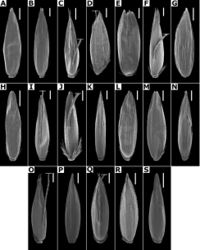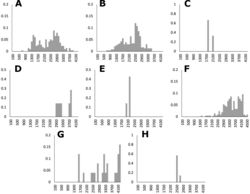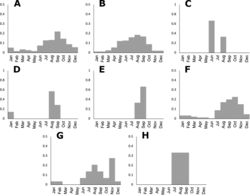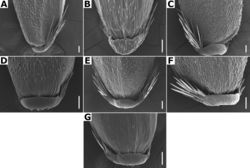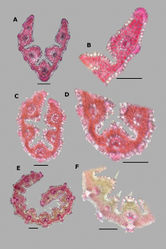Agrostis variabilis
| Notice: | This page is derived from the original publication listed below, whose author(s) should always be credited. Further contributors may edit and improve the content of this page and, consequently, need to be credited as well (see page history). Any assessment of factual correctness requires a careful review of the original article as well as of subsequent contributions.
If you are uncertain whether your planned contribution is correct or not, we suggest that you use the associated discussion page instead of editing the page directly. This page should be cited as follows (rationale):
Citation formats to copy and paste
BibTeX: @article{Vigosa-Mercado2023PhytoKeys230, RIS/ Endnote: TY - JOUR Wikipedia/ Citizendium: <ref name="Vigosa-Mercado2023PhytoKeys230">{{Citation See also the citation download page at the journal. |
Ordo: Poales
Familia: Poaceae
Genus: Agrostis
Name
Agrostis variabilis Rydb., Mem. New York Bot. Gard. 1: 32. 1900. – Wikispecies link – Pensoft Profile
- Agrostis varians Trin., Mém. Acad. Imp. Sci. Saint-Pétersbourg, Sér. 6, Sci. Math., Seconde Pt. Sci. Nat. 6,4(3–4): 314. 1841, nom. illeg. hom., non Thuillier 1799. Type: America borealis [Rocky Mountains?], J.D. Hooker T-217 (holotype: LE-TRIN; isotypes: MO (MO-992441 [image!], NY (NY327643 [image!], US (US00156511 [image!])).
Type
Based on Agrostis varians Trin.
Description
Plants perennial, slender, usually caespitose, rarely rhizomatous. Tillers extravaginal, with cataphylls. Rhizomes if present, up to 2 cm long. Culms 10–45 cm long, erect, nodes 1–2, glabrous, internodes glabrous. Leaves mostly basal; sheaths 0.8–6(–10) cm long, the lower ones longer than the internodes, the upper ones shorter, scaberulous; ligules 1–2.2 mm long, longer than wide, dorsally scaberulous, apices acute, erose to lacerate; blades 1–7 cm long, 0.5–1 mm wide, filiform, conduplicate to convolute, scaberulous on both surfaces. Panicles 1.5–13 cm long, 0.2–0.7 cm wide, contracted, dense, spiciform, linear, sometimes interrupted at the base, sometimes partially included in the upper sheaths; branches appressed, rebranching from below mid-length, scaberulous, with spikelets near their base, inferior branches up to 1 cm long; pedicels 0.3–2.2 mm long, appressed, scaberulous. Spikelets 1.4–2 mm long, greenish to stramineous, often tinged with purpure; glumes subequal, lanceolate, apices acute, 1-veined, scaberulous on the keel, lower glume 1.4–2 mm long, upper glume 1.3–1.9 mm long; callus glabrous; lemmas 1–1.4 mm long, elliptic, apices entire, acute, 5-veined, veins prominent distally, usually unawned, rarely awned above mid-length, awn up to 1 mm long, straight, not reaching the lemma apices; paleas absent; anthers 3, 0.3–0.6 mm long. Caryopsis 0.9–1.2 mm long, elliptic; endosperm solid. 2n= 28 (Harvey 2007[1]). Anatomy. Leaf blades convolute to v-shaped in transversal section; adaxial furrows medium-sized to deep, narrow; adaxial ribs rounded to triangular: keel absent; first order bundles circular in outline, sheath interrupted abaxially, abaxial sclerenchyma in strands or girders, narrowing towards the bundle, adaxial sclerenchyma in strands; second order bundles circular in outline, sheath interrupted abaxially, abaxial and adaxial sclerenchyma in strands; intercostal sclerenchyma absent; leaf margins with well-developed sclerenchyma caps, rounded; colorless cells absent (Fig. 37E, F). Lemmas with transversal thickenings irregular to oblong, wider than the unthickened portion of the wall; prickle hairs present, scarce (32G).
Distribution and habitat
Agrostis variabilis is distributed from Alaska to the northern peninsula of Baja California, Mexico. In the study zone, it has been collected in the USA state of California, and the Mexican state of Baja California (Fig. 39B). This species has also been reported from Chihuahua (Sánchez-Ken 2019[2]), but no specimens from this state were seen. Agrostis variabilis grows in open areas of temperate forests with Pinus, between 2400–2639 m a.s.l. (Fig. 27H).
Phenology
Specimens with spikelets have been collected from July to September (Fig. 28H).
Commentaries
It has been reported for other regions that the spikelets can reach 2.5 mm long (Harvey 2007[1]). This species is often confused with the smaller forms of A. exarata, but differs from them in the mostly basal leaves, with filiform and convolute to involute leaf blades, 0.5–1 mm wide (vs. basal and cauline leaves, leaf blades linear, flat, 1.5–4(–8) mm wide in A. exarata).
Conservation status
Agrostis variabilis is apparently a rare species in the study zone. It is represented by six collections, with its populations occurring in two protected areas. The EOO is 1,621 km2 and the AOO is 16 km2. Following the IUCN criteria, the preliminary assessment category is Endangered (EN).
Specimens examined
Mexico. Baja California: Municipio Ensenada, Sierra San Pedro Mártir, fairly common in dry meadow W of Vallecitos, 31.01089°N, 115.49504°W, 2450 m alt., 23 Aug 1968, R. Moran 15395 (SD [*,**], UC); common on gravelly arroyo bank, Tasajera, ca. 3 km NW of Los Llanitos, 30.98333°N, 115.44167°W, 2500 m alt., 3 Sep 1979, R. Moran 28010 (SD); Sierra San Pedro Mártir, fairly common in arroyo, Jeffrey Pine forest, Yerba Buena, 31.01292°N, 115.48002°W, 2475 m alt., 16 Aug 1967, R. Moran and R.F. Thorne 14157 (SD). Sierra San Pedro Mártir, 25 Sep 1982, A. Preciado 299 (MEXU [*,**]); Sierra San Pedro Mártir, campground and main gate area, 31N, 115.557W, 2461 m alt., 14 Jul 2013, S. Ratay et al. 235 (SD). USA. California: Riverside County, Mt. San Jacinto State Park, N side of Hidden Lake, 33.80022°N, 116.64119°W, 2639 m alt., 12 Jul 1999, L. Hendrickson 10430 (BSCA).
Taxon Treatment
- Vigosa-Mercado, J; Delgado-Salinas, A; Alvarado Cárdenas, L; Eguiarte, L; 2023: Revision of the genus Agrostis (Poaceae, Pooideae, Poeae) in Megamexico PhytoKeys, 230: 157-256. doi
Images
|
Other References
- ↑ 1.0 1.1 Harvey M (2007) Agrostis. In: Barkworth M Capels K Long S Anderton L Piep M (Eds) Flora of North America North of Mexico (Vol.24) Oxford University Press, New York, 633–662. http://floranorthamerica.org/Agrostis
- ↑ Sánchez-Ken J (2019) Riqueza de especies, clasificación y listado de las gramíneas (Poaceae) de México. Acta Botánica Mexicana 126: e1379. https://doi.org/10.21829/abm126.2019.1379
